Dear friends and supporters,
In 2024, our movement to protect Indigenous peoples’ rights and rainforests gained powerful momentum. Though there were many challenges—from historic droughts and devastating fires to public health crises fueled by illegal mining—the strength and resilience of our Indigenous partners in safeguarding their territories, cultures, and the climate we all share remains a constant source of inspiration.
Through strong collaboration with our Indigenous partners, allies, and the efforts of our dedicated team, we achieved some important milestones towards Land Rights, Rainforest Protection, and Strengthening Indigenous Organizations this year. For example, through our land titling initiative, 20 communities in Peru secured legal titles in record time for 75,000 acres of their ancestral lands. Our work in Panama with the Emberá and Wounaan peoples and two key allies resulted in advancing land tenure security for nearly 300,000 acres—an area larger than the city of Dallas. In Brazil, we deepened our partnership with the Indigenous Council of Roraima (CIR) and local allies to monitor lands under threat from illegal mining. And in Central America, in collaboration with the Mesoamerican Alliance of Peoples and Forests (AMPB), we successfully completed the three-year B’atz Regional Institutional Strengthening Project, which strengthened the governance, administration, and financial capacities of Indigenous and local community organizations, one of our core priorities.
Building on these achievements, we have ambitious plans moving forward, which you can read about in our strategic plan. By 2030, we aim to expand our land titling efforts to over 12 million acres, increase community-based monitoring to nearly 50 million acres, and more than double the number of organizations we support. Though political shifts and changing climate agendas in the United States will require careful navigation, we remain confident in the resilience of our partners and the enduring strength of the environmental movement to maintain momentum despite these challenges.
Together for rainforests,


Suzanne Pelletier
Executive Director
Supported titling initiatives aiming to secure land tenure for more than 11M acres across Guyana, Panama, and Peru. Nearly 94,000 acres of land titles secured!
Supported 307 community-based patrollers to monitor over 20M acres of Indigenous lands across Guyana, Brazil, Peru, and Panama using RFUS’s tech-enabled monitoring program—Rainforest Alert.
Secured over $4M for Indigenous organizations and communities through fiscal sponsorships and joint grants, while also helping partner organizations secure more than $2.5M in direct grants. Additionally, RFUS provided tailored institutional strengthening support to 25 organizations.
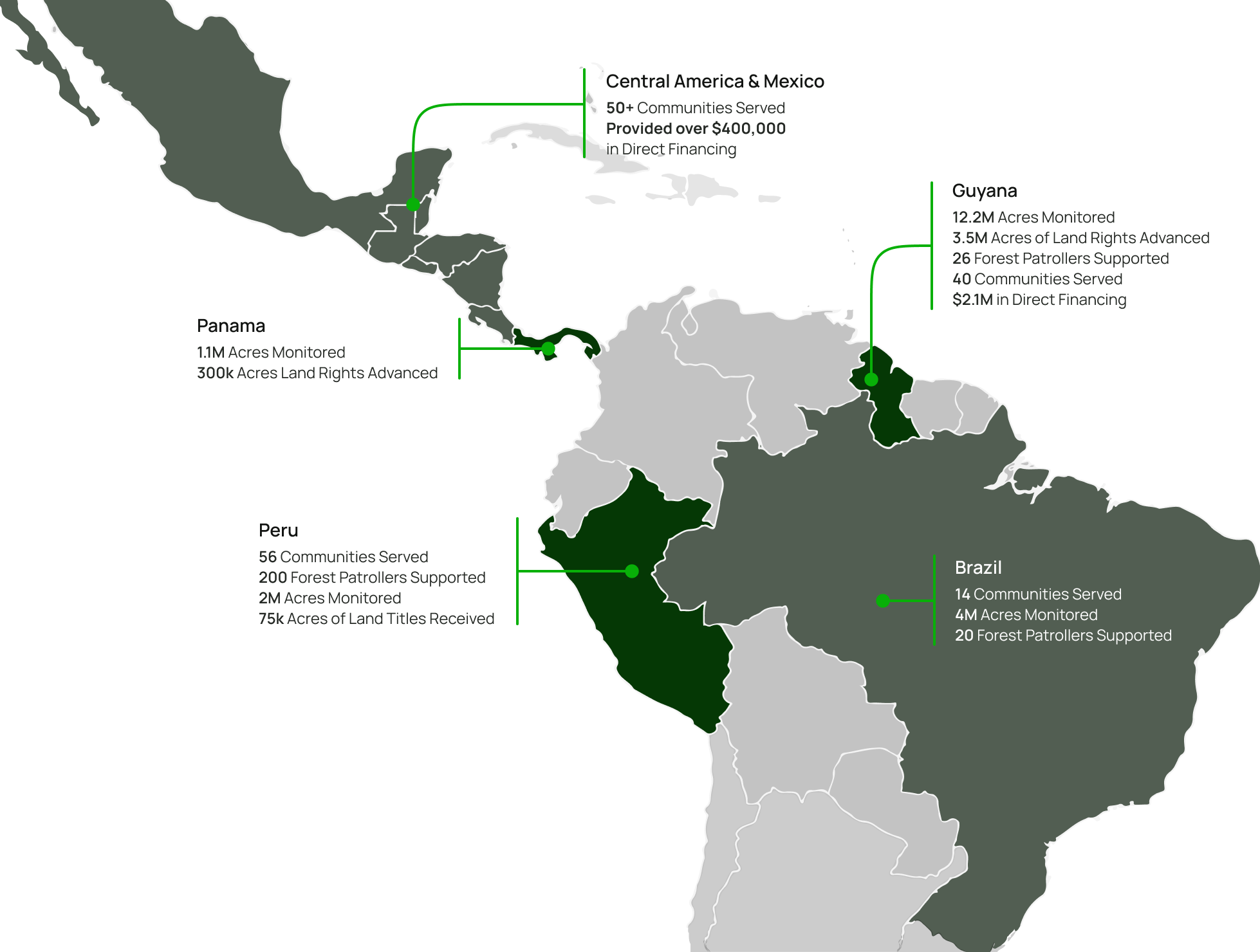
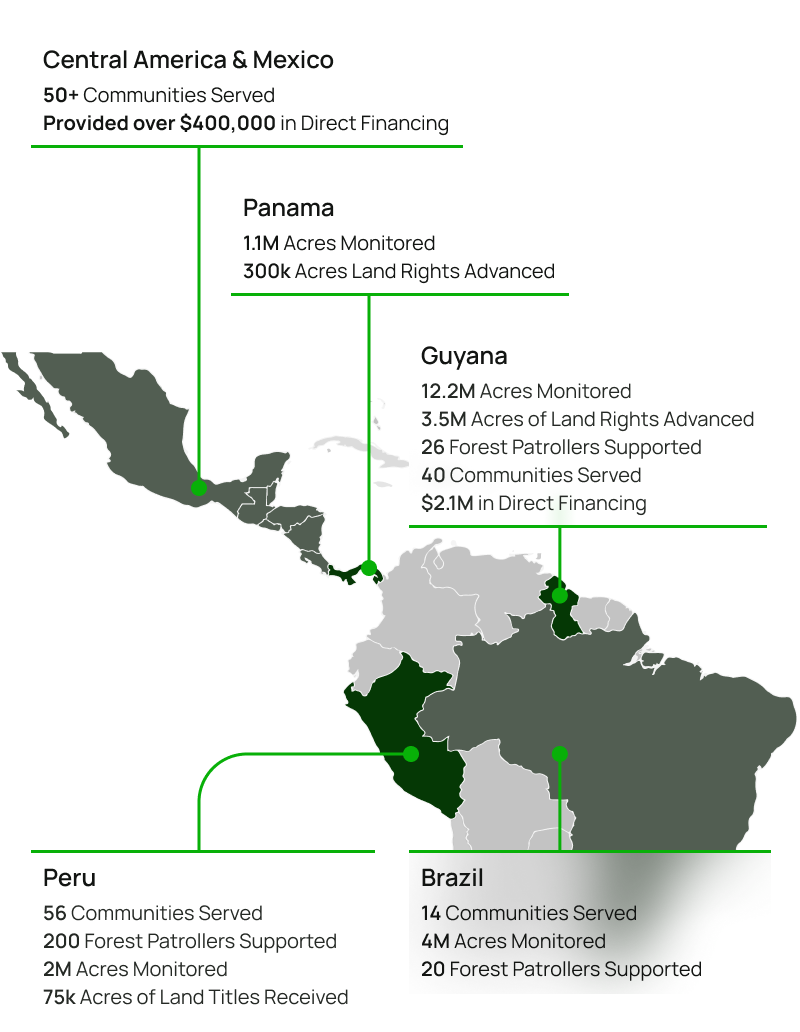
The purpose of Rainforest Foundation US is to support Indigenous peoples and forest communities in their efforts to secure their lands, protect their environment, and uphold their rights.
Three strategic priorities guide our work to support our Indigenous partners in protecting their rights and their rainforests
Mounting evidence shows what we’ve known since our founding—that rainforests protected by Indigenous peoples are healthier and store more carbon than even national parks. But without legal recognition of their lands and the protection of their human rights, Indigenous peoples face significant challenges in safeguarding these vital, carbon-storing forests. We support the protection of Indigenous peoples’ land rights through a variety of means, including providing legal assistance for new and expanded land claims, helping to delineate territorial boundaries, reinforcing existing land rights, and providing communities with the information they need to make informed decisions about topics like carbon markets.
Deforestation is a major driver of the climate crisis. In fact, it’s the second leading cause of carbon emissions, and it’s a key factor pushing the planet towards an ecological tipping point. Through territorial monitoring and land use planning, we provide Indigenous communities with the tools, training, technology, and resources they need to curb deforestation. This includes support through our Rainforest Alert program.
Organizations with strong governance and administration are better able to manage and protect their forests. They’re also better able to receive and manage direct global funding to continue the essential work they have always done to safeguard forests. Through our institutional strengthening program, we work closely with Indigenous organizations to build true partnerships, ensuring that Indigenous peoples and local communities and their organizations are resilient, sustainable, and better able to manage and defend their forests—and their rights.
Legal, Technical, & Advocacy Support
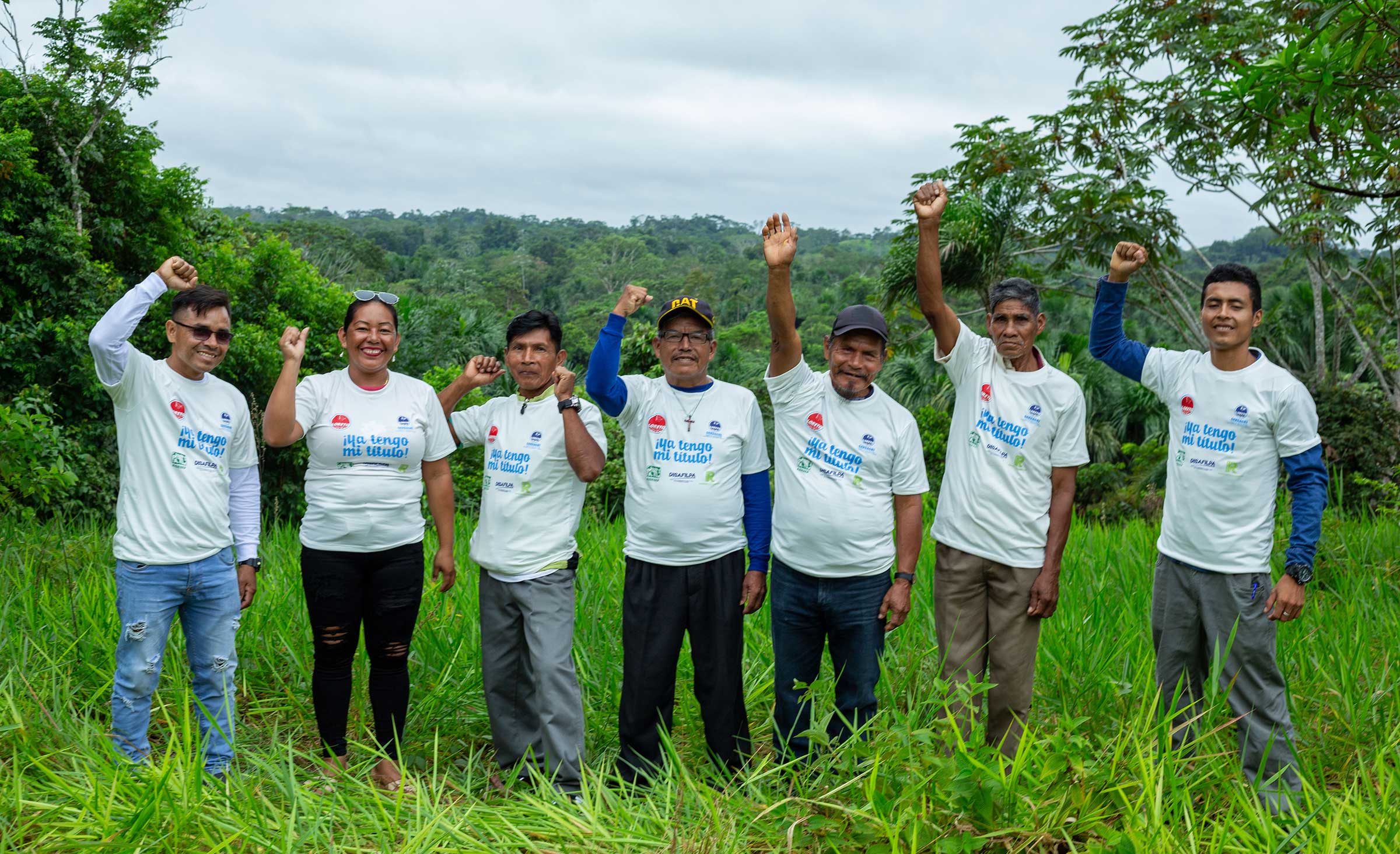
Anibal Oliveira
Indigenous Ticuna leader of the San Salvador community
Recognizing and securing Indigenous land rights is crucial to protecting the livelihoods, cultures, and rainforests that Indigenous peoples have long defended. In a landmark victory for Indigenous peoples in Peru’s Amazon, 20 communities secured legal titles for 75,000 acres of their ancestral lands, an area three times the size of Manhattan. This milestone was achieved through an innovative and cost-effective approach facilitated by Rainforest Foundation US (RFUS) that combines Indigenous leadership, collaboration with regional governments, and advanced mapping and satellite technology. Through this initiative—and in close partnership with the Interethnic Association for the Development of the Peruvian Rainforest (AIDESEP) and the Regional Management of Agrarian Development and Irrigation of the Loreto region in Peru (GERDAGRI)—we were able to significantly accelerate the titling process, meaning what historically took years was accomplished in just months. This was the second year we successfully applied this approach—a crucial climate solution that we hope to expand on and replicate elsewhere in the Amazon.
In Panama, RFUS supported the Emberá and Wounaan Indigenous peoples to advance land tenure security for over 300,000 acres of their ancestral lands—an area slightly larger than the city of Dallas. By partnering with Indigenous communities and two key organizations— Geoindígena and Native Future—this project took critical steps to advance these land rights. This work included successfully annulling a massive, outdated oil concession that covered nearly a third of Darien Province and obstructed multiple land title applications. It also involved collaborating with government prosecutors and agencies to revoke several illegal logging permits on Indigenous lands along the Tuira River in Darien, and resubmitting the affected Indigenous land claim. These efforts were critical in safeguarding the Emberá and Wounaan peoples’ ancestral territories from extractive industries seeking to exploit their lands for profit.
Photo: AMPB
Over the past decade, soaring global gold prices have driven an increase in illegal and unregulated gold mining in Guyana, particularly in the Wapichan people’s headwaters. This mining has led to mercury contamination of vital waterways, which include some of Guyana’s largest rivers—such as the Rupununi, Rewa, Kwitaro, Kuyuwini, and Takatu—as well as significant malaria outbreaks in the region. To combat these mining activities, the South Rupununi District Council (SRDC)—with support from RFUS—developed the Wapichan Headwaters Management Plan to protect the lands of Indigenous communities in these headwaters. In 2024, the communities who call these headwaters home officially validated the plan. This plan provides a new tool for local governance and strengthens Indigenous control over the region, while also creating an opportunity for dialogue with the government of Guyana to align a shared vision for protecting the forests and lands of this vital ecosystem.
Cameron Ellis
Field Science Director
Photo: Piratá Waurá/ISA
Photo: Piratá Waurá/ISA
Infrastructure projects are driving deforestation in the Amazon, encroaching on Indigenous lands and threatening sacred sites, cultural heritage, and the survival of entire communities. This includes the critical headwaters of the Xingu River, which spans over 65 million acres. The Xingu region is one of the world’s most biodiverse areas, home to 26 Indigenous peoples and hundreds of riverside communities.
Despite the Brazilian Constitution and international law recognizing Indigenous peoples’ right to Free, Prior, and Informed Consent (FPIC) for any project or activity that could impact their lands, these protocols are often ignored by developers and extractive industries. In response, in partnership with the Brazilian NGO Instituto Socioambiental (ISA), RFUS supported the Xingu Indigenous Territory Association (ATIX) in implementing their FPIC protocols to protect against threats stemming from highway and railway projects. This support facilitated coordination among Indigenous communities, the private sector, and public authorities, ensuring effective dialogue during the consultation process. Xingu long advocated for changes to the route of the highway, which would have impacted headwaters and sacred sites. Their efforts paid off. In 2024, the route was altered in a significant win.
In 2024, RFUS supported the Global Alliance of Territorial Communities (GATC) in advancing its engagement with the Forest Climate Leaders Partnership (FCLP), a coalition of governments formed at COP26 in 2021 to drive political commitments to halt deforestation in tropical forest countries. A key achievement in 2024 was the launch of a new platform for dialogue and learning, co-chaired by the governments of Norway and Peru, designed to facilitate governmental collaboration with Indigenous peoples and local communities. The platform has been working with the GATC to address specific requests from forest country governments, including support for Indigenous REDD+ in Peru, crafting FPIC processes in Ecuador, and mobilizing financing for forest investment plans in Indigenous territories in Costa Rica.
The FCLP also launched a new pledge, set to be announced at COP30 in 2025. This pledge calls on countries to identify specific areas of Indigenous and local communities’ lands to be titled, aiming to establish a target number of hectares for titling and linking it to the Forest Tenure Funders Group’s (a global donor coordination group established to facilitate donor collaboration and accountability in delivering on the COP26 Pledge) financing pledge. If successful, it will encourage countries to commit to titling land for Indigenous peoples and local communities—critical in the efforts to protect these forests. The GATC is actively working to secure more countries’ support for the recognition of Indigenous lands and territories.
Photo: GATC
Photo: GATC
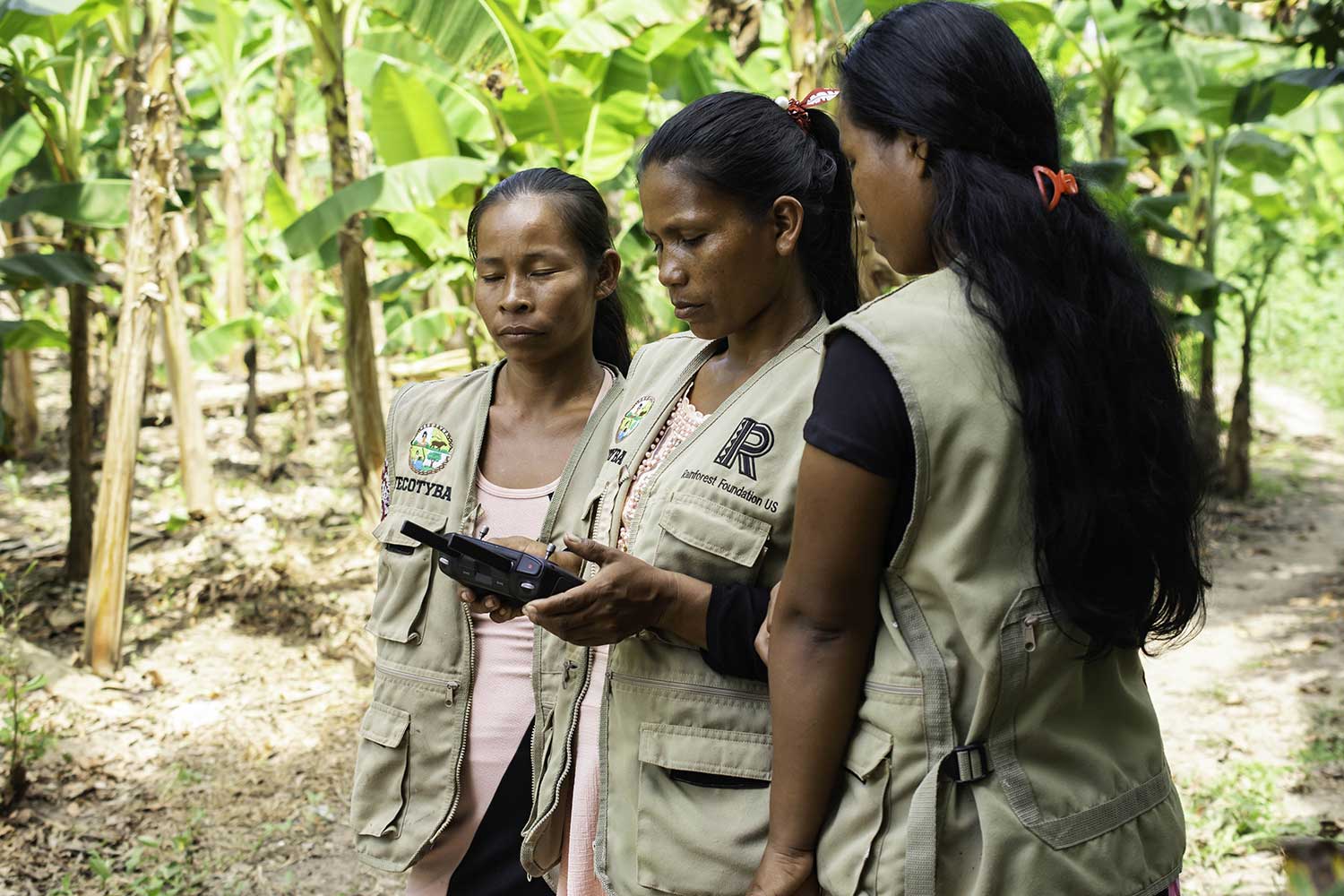
Wendy Pineda
General Project Manager, RFUS Peru
In 2024, Rainforest Foundation US (RFUS) actively supported the protection of over 20 million acres of tropical forest—an area nearly the size of South Carolina—by applying new tools, training, and technology. This effort included training and equipping 307 community-based forest patrollers across 129 communities in Peru, Brazil, Guyana, and Panama.
RFUS has also adapted and expanded our traditional forest monitoring programs to respond to the evolving impacts of climate change. For example, in response to the worst drought and fire season in recent history, our network of community forest patrollers in Peru mobilized to tackle these unprecedented fires. Equipped with tools provided by RFUS, they documented active fires by recording GPS coordinates, taking photos and videos, and coordinating with community members to create firebreaks and extinguish flames with water.
For the Tikuna peoples in Buen Jardín del Callaru, the fires began near the border with a neighboring community. The community—organized by the patrollers—dug trenches and used crop fumigation pumps filled with water to try to extinguish the fires. This effort illustrates how Indigenous-led monitoring efforts can help address urgent challenges by providing tools for crisis response.
Photo: SEDUUME
RFUS proudly partnered with the Associação Wanasseduume Ye’kwana (SEDUUME) to advance Indigenous-led protection of Ye’kwana lands within the Yanomami territory of Brazil. Supported by the Indigenous Council of Roraima (CIR) and Instituto Socioambiental (ISA), this partnership helped organize a powerful general assembly and hosted dynamic workshops to train youth in drone piloting, mapping, and using aerial technology to tell their own stories and monitor their lands.
Looking ahead, RFUS hopes to deepen its support for SEDUUME by expanding these monitoring initiatives and delivering continuous training in monitoring technology, security, and other relevant topics. RFUS is also helping to launch territorial control posts, along the Auaris and Uraricoera Rivers, to curb illegal mining and strengthen coordination with government enforcement bodies. This is not just about defending territory—it’s about supporting and amplifying Indigenous leadership in protecting the Amazon.
Photo: SEDUUME
With support from RFUS, the US State Department, and other allied organizations, Tech Camps united Indigenous leaders, scientific experts, and civil society to meet as equals and to co-create cutting-edge solutions for rainforest protection. What started as small workshops in 2019 evolved into impactful regional events.
In 2024, RFUS hosted two Tech Camps in the Amazon. The first, in partnership with Organización Regional de los Pueblos Indígenas del Oriente (ORPIO) and Organización Regional de AIDESEP-Ucayali (ORAU), focused on mapping wildlife hotspots and illegal trafficking routes—tools that now guide strategies to defend biodiversity across Indigenous lands.
Apu Jamer López Agustín
President of ORAU
The second Tech Camp, held in the heart of the Peruvian Amazon, gathered 70 participants, 50 of them Indigenous women leaders from Peru and Ecuador. Under the banner “Indigenous Women: Care and Resistance,” participants engaged in workshops and collective discussions to share strategies for defending their territories, strengthening their communities, and supporting one another amid escalating threats, from illegal logging and mining to drug trafficking and gender-based violence. These women are not just protecting the forest; they are standing on the frontlines of resistance, shaping the future of the Amazon. And these camps are more than tech trainings—they’re bold spaces of Indigenous leadership, resistance, and hope.
Janet Velasco Castillo
a representative of the Regional Association of Indigenous Peoples of the Central Jungle (ARPI SC)
Photo: AMBP
After three transformative years, Rainforest Foundation US (RFUS) and the Mesoamerican Alliance of Peoples and Forests (AMPB) concluded the B’atz Regional Institutional Strengthening Project. Supported by a $2 million grant from the US Agency for International Development (USAID), the project strengthened the governance, administration, and financial capacities of Indigenous and local community organizations across Mexico and Central America. It also helped establish the Indigenous and local communities-led Mesoamerican Territorial Fund (FTM), an innovative financial mechanism that channels global funding directly to these communities.
The B’atz project played an active role in developing AMPB’s first Strategic Plan, the inaugural Regional Gender and Climate Change Plan, and the establishment of the AMPB Board of Directors. These efforts drove significant progress in strengthening AMPB’s institutional and governance capacities. As the effects of climate change expand, so too does the impact on Indigenous communities on the frontlines of the climate crisis. The Mesoamerican Leadership School trained 100 individuals in disaster risk management, with eight Indigenous communities and 17 non-Indigenous rural communities across Mexico, Honduras, and Guatemala actively participating in the process. These efforts equipped local leaders, particularly women and youth, with essential skills for climate resilience and sustainable development. With strengthened governance, increased financial autonomy, and a focus on disaster preparedness, AMPB and its members are now well-positioned for lasting advocacy and sustainable growth.
Josh Lichtenstein
RFUS Policy Director
Photo: AMBP
Photo: AMBP
Photo: AMBP
Photo: AMBP
Photo: AMBP
A core aspect of our work is ensuring partners know what their rights are to protect their forests and the resources they contain, and to secure recognition of their ancestral land rights and resources, including carbon rights and the benefits from emerging carbon markets. However, these markets are complex and controversial, filled with principles, standards, rules, and requirements, making it difficult to fully understand their potential impacts—both positive and negative—on Indigenous peoples and their lands.
RFUS equips our partners with the tools and knowledge needed to navigate these markets and effectively advocate to protect their rights and advance their communities’ own self-determined priorities. In early 2024, the AMPB, in partnership with RFUS and Fundación PRISMA, hosted a pivotal meeting that brought together Indigenous leaders from across the region, technical experts, and allied organizations to coalesce around a collective vision and strategy for strengthening the integrity of carbon markets. It integrated the experiences, challenges, initiatives, and proposals of AMPB members based throughout the region. A significant outcome included the release of the joint statement “Towards Fair and Transparent Carbon Markets and REDD+ Processes.” The declaration calls for carbon markets and REDD+ initiatives to adopt effective measures to honor and protect community rights as a key input to combating global warming.
Levi Sucre Romero
Coordinator of the Mesoamerican Alliance of Peoples and Forests (AMPB)
Additionally, RFUS launched a six-part animated video series to demystify carbon markets and provide communities with essential information to protect their rights, whether they choose to engage in carbon markets or not. The series covers essential topics, including how carbon markets work and who the key players are, how communities can understand their rights regarding consultation, land rights, FPIC, and benefit-sharing, and what actions to take if issues arise. Developed in consultation with Indigenous organizations and legal experts, the videos were initially launched in English, Spanish, and Portuguese. The series was designed to be as accessible as possible to Indigenous peoples and local communities, which has resulted in subsequent translations with partnership support to French, Swahili, and Lingala as well—extending its reach far beyond our geographical scope!
In 2024, our partner the South Rupununi District Council (SRDC) received a four-year, $2.1 million grant, their largest direct grant to date.This grant will support their efforts to secure and sustainably manage approximately 3 million acres of tropical forest in Wapichan traditional lands. These forests are rich in carbon, hold significant cultural resources for the Wapichan people, and are home to several endangered species of flora and fauna. Over the past decade, SRDC has significantly expanded its organizational capacities, positioning themselves to directly manage and implement a project of this scale. This is a major achievement for SRDC and a big win for the South Rupununi region, which is experiencing severe environmental devastation due to the rise in illegal gold mining and associated impacts on community health and local culture. RFUS has partnered with SRDC for over 10 years and is proud to have contributed to their growth and helped secure this grant.
Photo: Federico Gutierrez Panduro
Photo: Billy Torres
Gina Ruiz-Caro Rothgiesser
Western Amazon Director
Articulação dos Povos Indígenas do Brasil (APIB)
Conselho Indígena de Roraima (CIR)
Associação Wanasseduume Ye’kwana (SEDUUME)
Associação dos Povos Indígenas Wai Wai do Xari (APIWX)
Associação Indígena Wai Wai da Amazônia (AIWA)
Instituto Socioambiental (ISA)
Associação Terra Indigena do Xingu (ATIX)
Alianza Mesoamericana de Pueblos y Bosques (AMPB)
Coordinadora de Mujeres Líderes Territoriales Mesoamericanas (CMLT)
Asociación de Forestería Comunitaria Utz Che (Utz Che)
Asociación de Comunidades Forestales de Petén (ACOFOP)
Red Mexicana De Organizaciones Campesinas Forestales (Red Mocaf)
Federación de Productores Agroforestales de Honduras (FEPROAH)
Moskitia Asla Takanka (‘Unity of La Moskitia’, MASTA)
Amerindian Peoples Association (APA)
South Rupununi District Council (SRDC)
North Pakaraimas District Council (NPDC)
Upper Mazaruni District Council (UMDC)
Moruca District Council (MDC)
Asociación Interétnica de Desarrollo de la Selva Peruana (AIDESEP)
Organización Regional de los Pueblos Indígenas del Oriente (ORPIO)
Organización Regional de AIDESEP-Ucayali (ORAU)
Federación de Comunidades Nativas del Medio Napo, Curaray y Arabela (FECONAMNCUA)
Federación de Comunidades Tikuna y Yahuas del Bajo Amazonas (FECOTYBA)
Organización Kichwa Runa Wankurina del Alto Napo (ORKIWAN)
Federación del Pueblo Yagua del Río Apayacu (FEPYRA)
Federación de Comunidades Nativas Maijuna (FECONAMAI)
Asociación Matsés
Confederación de Nacionalidades Indígenas de la Amazonía Ecuatoriana (CONFENIAE)

Managing Partner, Wealth Partners Capital Group, LLC
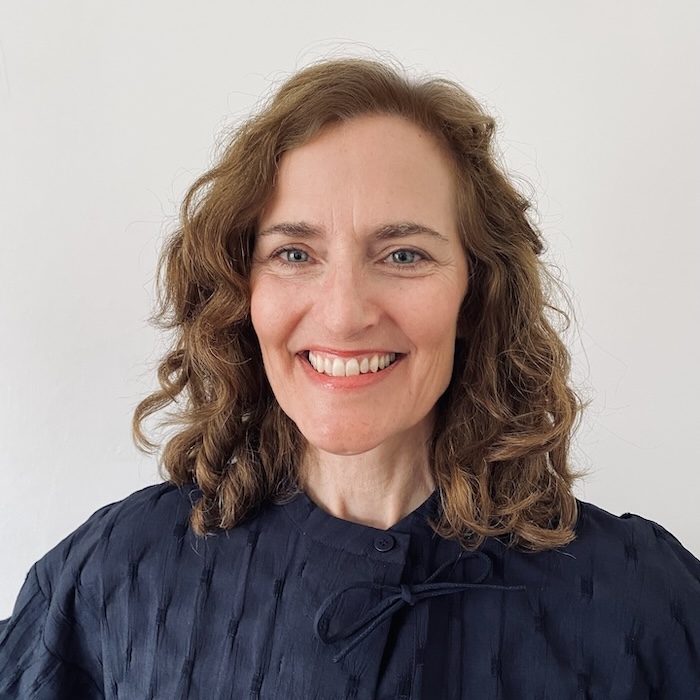
Executive Director, Rainforest Foundation US

Retired Finance Executive

Director of Equator Group

Partner, Simpson Thacher & Bartlett LLP; Member Executive Committee (founding Chair), The Cyrus R. Vance Center for International Justice
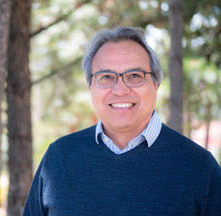
Distinguished Professor & the Nicholas Doman Professor of International Law, University of Colorado Law School

Founder, Lin Lane; Partner, The Fund

Principal & Managing Director, Stone Arch Group
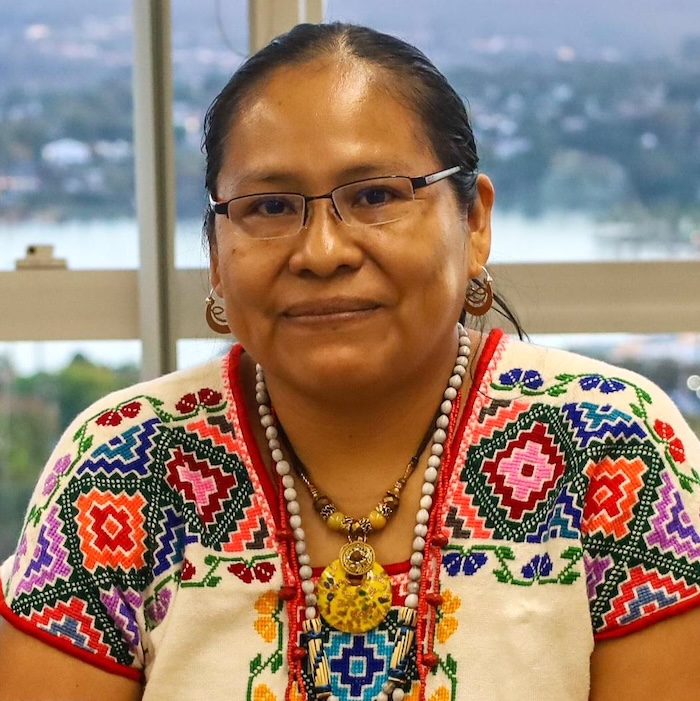
Policy and Advocacy Coordinator, Indigenous Peoples Rights International

Director of Natural Resources, Kayrros
A world where the rights of Indigenous peoples are respected and rainforests flourish.
Your support has helped to strengthen Indigenous peoples’ organizations in their capacity to fight deforestation, the effects of climate change, and the systemic violation of their rights. RFUS and our partners couldn’t make such a substantial impact without you. Thank you!
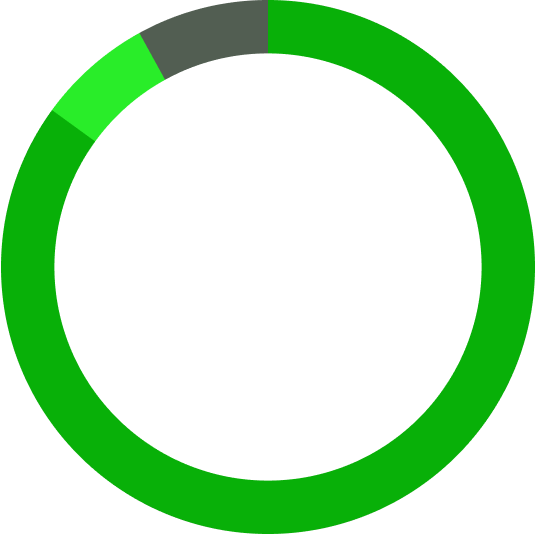
Rainforest Foundation US is committed to the highest standards of moral and ethical behavior and employs specific practices to combat the risk of financial irregularities. RFUS policy requires internal controls to prevent financial irregularities, including authorization, segregation of duties, reconciliation, monitoring, and safeguarding of assets in accordance with best practices. Additionally, all RFUS employees are encouraged to report any known or suspected financial irregularities, and have access to do so anonymously as outlined in our whistleblower policy.
Together, we are helping protect rainforests and safeguard our planet for future generations.
Thanks to your support, Rainforest Foundation US is working with Indigenous partners to address some of the most urgent challenges of our time: deforestation, the climate crisis, and human rights violations.
In these uncertain times, reliable, monthly support is crucial for RFUS to stay nimble and responsive to the immediate needs of our partners and support them with the tools, training, and resources necessary to keep their forests healthy for years to come. Visit our Ways to Support page to learn more about Treehouse, our monthly giving program, or explore other ways to get involved.



Get updates on our recent work and victories, hear stories from our Indigenous partners, and learn how you can get involved—straight to your inbox.